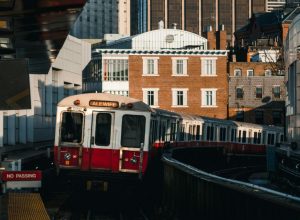Writer: Andrea Teran
 2 min read April 2024 — To make public transportation more accessible and affordable, the Massachusetts Bay Transportation Authority (MBTA) recently announced an initiative that will reduce transit fares for low-income riders by 50% — benefiting a ridership population across more than 170 communities, including Boston.
2 min read April 2024 — To make public transportation more accessible and affordable, the Massachusetts Bay Transportation Authority (MBTA) recently announced an initiative that will reduce transit fares for low-income riders by 50% — benefiting a ridership population across more than 170 communities, including Boston.
Set to be implemented in the summer of 2024, the program follows approval by the MBTA Board of Directors and is backed by the Healey-Driscoll Administration’s FY24 budget, which allocated $5 million for its development.
“This is an important step towards making mass transportation more affordable for those that need it the most,” said MBTA General Manager and CEO Phillip Eng in a press release.
The MBTA’s low-income fare program is designed to reduce transportation costs for a broad segment of the population. Specifically targeting riders aged 26-64 with low incomes, the program offers a 50% discount across all MBTA modes, including buses, trains, and the paratransit service known as the RIDE. Eligibility for these reduced fares is based on participation in assistance programs that require an income at or below 200% of the federal poverty level, which amounts to around $30,000 annually or lower for an individual. This initiative is expected to make a significant impact, with over 60,000 riders anticipated to qualify, potentially leading to up to 8 million additional trips per year.
“Expanding low-income fares will help to ensure that our transportation system is more equitable and more affordable, which supports the mission to give everyone greater access to mobility options, especially community members depending on transit,” said Transportation Secretary and CEO Monica Tibbits-Nutt in a press release.
Beyond the low-income fare program, the MBTA announced two other fare adjustments: phasing out paper CharlieTickets in favor of plastic CharlieCards and permanently expanding the $10 Weekend Commuter Rail Pass to include federal holidays, facilitating unlimited Commuter Rail trips during these periods.
Despite the program’s promising prospects, it navigates a complex landscape of sustainability and operational challenges.
The projected annual cost, ranging between $52 million and $62 million upon full implementation, highlights the need for sustainable funding mechanisms. A crucial element underpinning the program’s development is the equity analysis conducted by the Central Transportation Planning Staff to the Metropolitan Planning Organization. The analysis evaluated the fare changes to ensure they do not produce disparate impacts on minority riders nor disproportionate burdens on low-income riders.
The initiative emerges amid broader discussions on the future of public transit in Boston, including debates around the city’s capacity to address longstanding infrastructure and service reliability issues.
An August 2023 survey of 1,000 Massachusetts residents who live in the 175 MBTA communities indicated that more than one-third of current riders are riding the T less than they did before the pandemic, with 15% citing speed and reliability as a top reason for less frequent ridership. However, making the T “free to ride” would have the largest impact on swaying residents, with 57% of respondents saying it would make them more likely to ride more.
“The MBTA is committed to making meaningful improvements for riders, including making fares more affordable, which will improve quality of life, boost economic mobility, and encourage more riders to return to the system,” Eng said.
Top image via Kentaro Toma/Unsplash
For more information visit:
